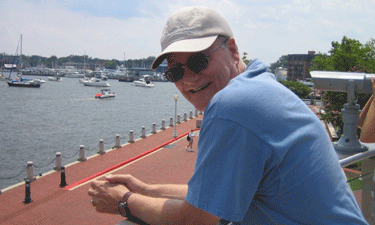 They say you can’t keep a good man down, and that’s certainly true of Larry Allen. Not even the sweet embrace of retirement could best this numbers whiz, who, at the spry age of 61, decided to re-enter the working world as NRPA’s director of accounting. “[After a year of retirement] in the words of the great John Riggins, I decided, ‘I’m bored, I’m broke, and I’m back!’” he says. Those who have enjoyed the pleasure of working with Allen during his five-plus years here at headquarters are certainly glad for it. We convinced NRPA’s resident numbers cruncher to shelve his abacus for a moment and give us some insight into his personal and professional life.
They say you can’t keep a good man down, and that’s certainly true of Larry Allen. Not even the sweet embrace of retirement could best this numbers whiz, who, at the spry age of 61, decided to re-enter the working world as NRPA’s director of accounting. “[After a year of retirement] in the words of the great John Riggins, I decided, ‘I’m bored, I’m broke, and I’m back!’” he says. Those who have enjoyed the pleasure of working with Allen during his five-plus years here at headquarters are certainly glad for it. We convinced NRPA’s resident numbers cruncher to shelve his abacus for a moment and give us some insight into his personal and professional life.
Parks & Recreation magazine: Tell us a bit about your background before you came to NRPA.
Larry Allen: I have a bachelor’s degree in economics and business from Emory & Henry College and a BCS in accounting from Benjamin Franklin University. After graduating, I worked at a CPA firm for several years, then a few for-profit organizations. These organizations provided me valuable accounting and business experience before entering the nonprofit world. Since coming to the association community, I have worked with the building industry for 10 years and the industrial design industry for 14 years.
P&R: What drew you to your current position?
Allen: After 24 years in the nonprofit community, with the last six as chief financial officer, I found myself spending more time working on legal issues, personnel issues, politics and other nonaccounting responsibilities. So at the age of 60, I decided to retire. [A year later] I talked with some staff about NRPA, its mission and specifically the role of director of accounting. It felt like a wonderful opportunity and matched my qualifications and desires with its needs. I applied, NRPA offered and I hope we have both been happy since.
P&R: What’s your number-one financial tip for young people?
Allen: Most everyone who gives young people financial advice tells them starting to save money early is the key. This is extremely important. Even if you are only saving a small amount to begin with, it forms good financial habits that stick, and even small amounts compound to larger amounts over time. Beyond that, but also important, is developing a system of tracking your savings and spending. Regularly prepare a net worth statement (assets/liabilities/net worth) to watch your savings as they grow over time. At some point, the bell rings and you find yourself looking forward to the next time you prepare your net worth statement and seeing your investments grow. Also, prepare an earnings and expense statement. Once you see how large some of your discretionary expense totals are, you may consider adjusting your spending patterns and saving a little more.
P&R: Do your family and friends ask you to do their taxes? And, if so, do you do them?
Allen: Not after they see my rates! I keep these as high as possible so people won’t ask.
P&R: What are your interests outside of work?
Allen: I enjoy time with my family. [My wife of 41 years] Lynne and I have a granddaughter who just turned two who has a wonderful personality. She is just beginning to string words together into sentences, so it’s still really fun to guess what her expressions are trying to communicate.
I enjoy having a boxer around the house. Gus is our fourth boxer (we love the breed), and while there are similarities between them all, each one has had a distinctively different personality. Gus is our timid one.
I also enjoy operating large construction equipment. While at home, I have a small tractor that I use to attempt to do as much yard work as possible. But through friends in the equipment industry I have had the opportunity to operate backhoes, dozers, excavators and even an articulating logger skidder. It’s like being a kid again, but with large expensive toys!
Samantha Bartram is the Associate Editor of Parks & Recreation magazine.

